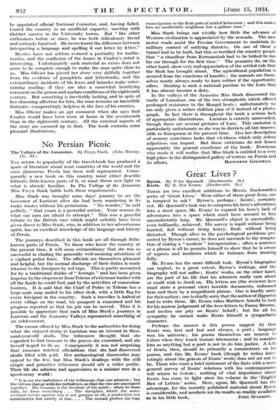Great Lives ?
TnEsE are two excellent additions to Messrs. Duckworth's series of 'Great Lives." Were either of them great lives, one
is tempted to ask ? Byron's, perhaps ; Keats', certainly not. Mr. Quennell's task was to compress his hero's adventures into a short space, Mr. Evans' to expand his hero's lack of adventures into a space which must have seemed to him uncomfortably long. Mr. • Quennell's object is successfully, even brilliantly, achieved. His survey is rapid without being hurried, full without being heavy, fresh without being distorted. Though alive to the psychological problems pre- sented by Byron's career, he does not succumb to the tempta- tion of risking a " modern" interpretation ; often a sentence or a phrase is all he permits himself to show that he is aware of aspects and incidents which he forbears from treating fully.
Mr. Evans has the more difficult task. Byron's biographer can neglect, to a great extent, Byron's writings, and the biography will not suffer ; Keats' works, on the other hand, are the part of his life that his admirers really care about or could wish to dwell on. His letters arc {the reviewer here must state a personal view) horrible documents, redeemed -here and there by a magnificent phrase. One is hardly sorry for their author; one is chiefly sorry that the author of Hyperion had to write them. Mr. Evans takes Matthew Arnold to task for his austere judgement of the love-letters to Fanny Browne, and invites our pity on Keats' behalf ; but for all his sympathy. he .cannot make Keats himself a sympathetic character.
Perhaps the answer is (his poems suggest it) that Keats was, first and last and always, a . poet ; language was his universe ; his poems themselves are nearest to failure when they touch human intercourse ; and to consider him as anything but a..poet is not to do him justice. A Life of Keats, then, should be primarily a commentary on his poems, and this Mr. Evans' book (though he writes inter- estingly about the genesis of Keats' work) does not set out to be. Those who want a brief statement of the facts with a more general survey of Keats' relations with his contemporaries will return to Colvin ; nothing of vital importance about Keats has come to light since his volume in the English Men of Letters' series. Here, again, Mr. Quennell has the advantage, for the recently published material about Byron is considerable, and nowhere are its results so readily available
















































 Previous page
Previous page